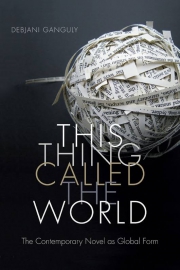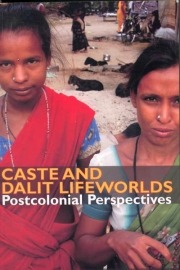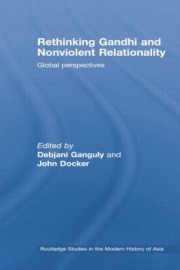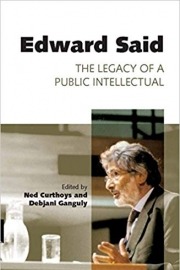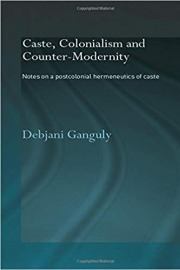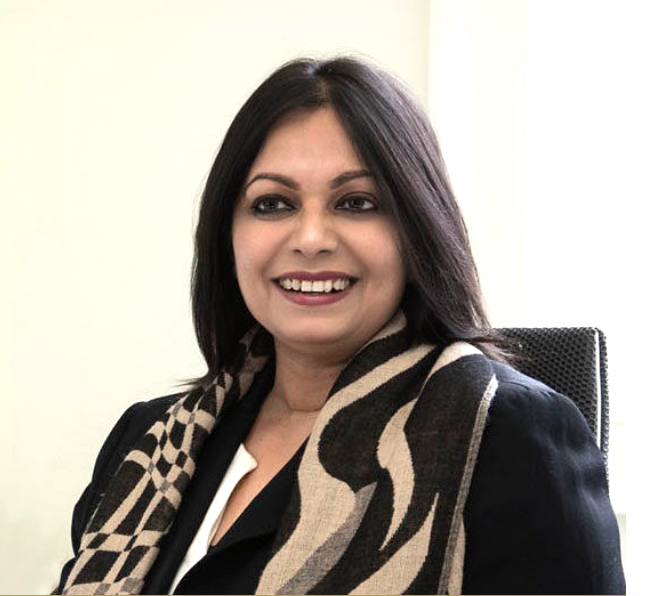
Debjani Ganguly
Professor; Director, Institute of the Humanities and Global Cultures (IHGC)
122 Wilson Hall
Office Hours: Tues 2.00-3.00pm or by appointment
Class Schedule: Fall 2019, ENGL 8559: Oceanic Connections: Black Atlantic and Indian Ocean Worlds
Tue 3.30-6.00pm
Specialties
Postcolonial Studies, World Literature, Global Anglophone Novel, Literary Forms in the New Media Age, Caste and Dalit Studies, Indian Ocean Literary Worlds, War, Literature and Human Rights, Technologies of Violence
Research
I work on postcolonial, global and world literatures. My recent monograph, This Thing Called the World: The Contemporary Novel as Global Form, tracks the interlaced histories of globalism, information technology, ethnic violence and humanitarian connectivity through the genre of the novel. It reprises the novel’s historical links to distant suffering and technologies of mediation - the staple of debates on the sentimental novel and the rise of Abolitionism in the late 18th century - in the context of the emergence of novels written against the backdrop of contemporary global wars and ethnic conflict. New media technologies and multiple visual regimes have been critical in mediating these sites of violence for diverse publics around the world. My book addresses the ways in which contemporary global novels capture the impact of this hyper-mediated violence in their points of view, their space-time configurations, their modes of addressing the reader and their moral imagination. Works on the Palestinian crisis, the wars in Iraq and Afghanistan, the Kashmir conflict, post-9/11 America, and the Rwanda genocide, feature as case studies.
I am currently at work on a book project, Catastrophic Form: Drones, Toxins, Climate. The project explores the contemporary novel and its mediation of human/posthuman life-forms in the era of techno-security and biogenetic capitalism, and anthropogenic climate change. Three iconic catastrophic scenarios feature in my analysis: drone warfare, industrial/nuclear accidents and devastated coastal ecologies. The larger horizon of this research lies in the contemporary emergence of a vibrant interdisciplinary discourse on biological, technogenic and geological understandings of human beings and their relation to political belonging and social justice.
My first monograph, Caste, Colonialism and Counter-Modernity (2005), is both an intellectual history and a revisionist ethnography of caste and untouchability in India from the point of view of theoretical developments in the field of postcolonial studies. Spanning a period from the eighteenth century to the present, the book traces the discursive horizons of 'caste' from early colonial histories and anthropological tracts to contemporary dalit literature and postcolonial historiographical projects such as Subaltern Studies. It argues that caste is not so much an essence responsible for India's ‘backwardness’ as a constellation of variegated social practices that are in a constant state of flux and that cannot be completely contained in a narrative of nation-building, modernisation and development. What is offered in this analysis is not an endorsement of either the caste-system or casteism, but a resistance to the reified ways in which caste continues to figure in social scientific and nation-building discourses.
I am the general editor of a two-volume The Cambridge History of World Literature (2020), and of a CUP book series Cambridge Studies in World Literature.
I have published essays on Indian language worlds in The Cambridge History of Postcolonial Literature (2011) and on Dalit life-stories in The Cambridge Companion to Modern Indian Culture (2012). Other recent publications include essays on the novel after 1989 in The Cambridge Companion to the Postcolonial Novel (2015), and the normative provenance of world literature in The Values of Literary Studies (CUP 2015).
Two other edited volumes on postcolonial and global studies include Edward Said: The Legacy of a Public Intellectual (2007), and Rethinking Gandhi and Nonviolent Relationality: Global Perspectives (2007)
Visiting Positions
Seminar Faculty, The Institute for World Literature (IWL), Harvard University, 2015
Halls Visiting Professor, Centre for the Humanities and Department of English, University of Wisconsin, Madison, 2015
Visiting Fellowship, University of Cambridge, Clare Hall and Centre for Research in Arts, Social Sciences and Humanities, 2013
Visiting Fellowship, University of Chicago, Department of South Asian Languages and Civilizations, 2010
Board Memberships
Harvard Institute for World Literature, 2014-2020
International Comparative Literature Association (ICLA), 2016-2020
Consortium of Humanities Centres and Institutes (CHCI), 2009-
The Academy of Global Humanities and Critical Theory, 2016-
CLARINS (Common Language Resources and Technology Infrastructure, a pan-European collaborative effort, Utrecht University), 2008-2013
Project Bamboo, Digital Humanities Project led by University of California, Berkeley, 2009-2013
Australasian Consortium of Humanities Research Centres (ACHRC), 2011-2015
Books
The Cambridge History of World Literature ed. 2 volumes, Cambridge University Press, forthcoming, 2020
This Thing Called the World: The Contemporary Novel as Global Form, Durham and London: Duke University Press, 2016
Caste and Dalit Lifeworlds: Postcolonial Perspectives, New Delhi: Orient Longman, 2008
Rethinking Gandhi and Nonviolent Relationality: Global Perspectives, ed. London and New York, Routledge, 2007
Edward Said: The Legacy of a Public Intellectual, ed. Melbourne University Press, 2007
Caste, Colonialism and Counter-Modernity: Notes on a Postcolonial Hermeneutics of Caste, London and New York: Routledge, 2005
Articles (select)
‘Catastrophic Form and Planetary Realism,’ New Literary History, Vol.51, No.2, forthcoming April 2020
‘Oceanic Comparativism and World Literature,’ The Cambridge History of World Literature, Cambridge University Press, forthcoming 2020
‘The Scale of the Historical Novel in Amitav Ghosh’s Ibis Trilogy’, MLA Volume on Amitav Ghosh, editors, Gaurav Desai and John Stratton, 2019
‘Salman Rushdie and the World Picture of Islam,’ The Wiley-Blackwell Companion World Literature, Volume 5, ed. B. Venkat Mani and Ken Seigneurie, 2019
‘Humanitarian Scripts in the World Novel’ in Worldmaking: Literature, Language, Culture, ed. Tom Clark, Emily Finlay, Phillipa Kelly, London: John Benjamins, 2017
‘The Value of Worldmaking in Global Literary Studies’ The Values of Literary Studies, ed. Ronan McDonald, Cambridge University Press, 2015.
‘Polysystems Redux: The Unfinished Business of World Literature,’ Cambridge Journal of Postcolonial Literary Inquiry, Vol.2, No.2, 2015
‘Postcolonialism’s Afterlife: The Novel after 1989’, The Cambridge Companion to the Postcolonial Novel, ed. Ato Quayson, Cambridge University Press, 2015.
‘The Subaltern After Subaltern Studies: Genealogies and Transformations’ South Asia: Journal of South Asian Studies, Vol. 38, No. 2, 2015
‘The World Novel, Mediated Wars and Exorbitant Witnessing,’ Cambridge Journal of Postcolonial Literary Inquiry, 1:1, 2014.
‘Dalit Life-Stories’, The Cambridge Companion to Modern Indian Culture, ed. Vasudha Dalmia, Cambridge University Press, 2012
‘Frontiers of Life and Death: The Human, New Wars and World Literary Sensibilities’, What was the Human? Ed. Liam Semler, et.al. Melbourne: Australian Scholarly Publishing.
‘Deathworlds, The World Novel and the Human’, Angelaki, Vol. 16, No. 4, 2011
‘The Language Question in India’, The Cambridge History of Postcolonial Literature, ed. Ato Quayson, Cambridge University Press, 2011
‘Orbits of Desire: Bollywood as Creative Industry’, Bollywood in Australia ed. Andrew Hassam, Perth: University of Western Australia Press, 2010
‘Pain, Personhood and the Collective: Dalit Lifestories’, Asian Studies Review, Vol. 43, No. 4, 2009
‘Literary Globalism in the New Millennium’, Postcolonial Studies, Vol. 11, No. 1, March 2008
‘Global Literary Refractions: Reading Pascale Casanova’s The World Republic of Letters’, English Academy Review, Vol. 25, No. 1 June 2008.
‘From Empire to Empire: Writing the Transnational Anglo-Indian Self in Australia’, Journal of Intercultural Studies, Vol. 28, No 1, 2007
‘Edward Said, World Literature and Global Comparatism’, in Edward Said: The Legacy of a Public Intellectual, eds. Ned Curthoys and Debjani Ganguly, Melbourne University Press, 2007.
‘Buddha, Bhakti and Superstition: A Post-Secular Reading of Dalit Conversion,’ Postcolonial Studies, April 2004, Vol. 7, No.1, 2004
‘Transgressing Sacred Visions: Taslima, Rushdie and the Indian Subcontinent’, Shifting Continents, Colliding Cultures: Diaspora Writing of the Indian Subcontinent, eds. Ralph Crane and Radhika Mohanram, Amsterdam: Rodophi, 2000, pp 103-121
Invited Talks and Presentations (select)
2019, Georgetown University, ‘Anglo-Globalism, Area Studies and World Literature,’ American Comparative Literature Association Annual Conference
2018, Leuven University, ‘Drone Vision and Bio-Techno Terror,’ plenary lecture at the conference, “Romanticism in the Age of World Wars,’ November 11-13
2018, University of Pennsylvania, “Cultural Transitions”, invited panel speaker to Perry World House colloquium on “Competing Visions for the World Order” September 24-25.
2018, UCLA, “World Literature: Interlaced Histories, Translational Thresholds and Global Grammars”, American Comparative Literature Association Annual Conference
2018, Cornell University, “Catastrophic Comparisons: Reading Indra Sinha’s Animal’s People via Chernobyl” Society for Novel Studies
2016, New York University, ‘Real Virtualities in the Era of Humanitarian Reason’
2016, Cornell University, ‘The Skin of the World: Allegories of Global Terror,’, plenary lecture for the Society of the Humanities conference on ‘Performing Skin.’
2016, University of Bologna, “The Global South and Indian Ocean Worlds”
2015, University of Wisconsin-Madison, ‘The Contemporary Novel as Global Form,’ Mellon Sawyer Seminar
2013, Goldsmiths College, University of London, ‘Novelization after 1989.’
2013, University of Warwick, ‘What is the “World” in the World Novel?’
2013, University of Leeds, ‘A Non-Synchronous Contemporaneity: Novel Worlds after 1989,’
2013, University of Cambridge, ‘Networks and Assemblages: Novelization in Our Time’
2013, University of Queensland, ‘Humanitarian Scripts in the World Novel.’
2012, University of Oxford, Wadham College,’ Hypermediated Deathworlds: New Wars, The World Novel and Exorbitant Witnessing’
2012, University of Toronto, Centre for Diaspora and Translational Studies, ‘Novelisation and Witnessing in the Era of Humanitarian Wars’
2012, Duke University, ‘Deathworlds and the Global Novel’, invited panel convener for biennial conference on ‘Novel Worlds’ convened by the Society for Novel Studies, 26-28 April
2011, University of Cambridge, ‘What is the “World” in World Literature’, plenary address at the ‘Future University’ conference, at CRASSH, 1 July
2011, Duke University, ‘Global Humanities: An Antipodean Perspective’, Franklin Humanities Institute, 7 April
2010, Brown University, ‘Translation and Incommensurability’, CHCI Annual Conference, 16 June, panel coordinator and invited speaker.
2010, University of Michigan, ‘The World Novel, Distant Suffering and the Humanitarian Imagination after 1989’, Institute for the Humanities, 26 March, 2010, invited speaker and fellow
2010, University of Chicago, ‘The Language Question in Postcolonial India’, Centre for South Asia Studies, 8 April, invited speaker and fellow
2009, Stanford University, Humanities Centre, ‘Rethinking World Literature’, 15 December, invited speaker

